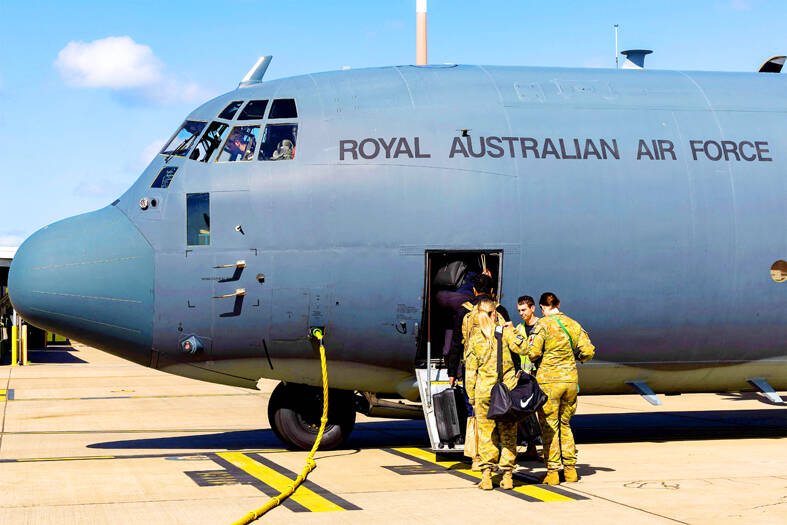Vanuatu’s new prime minister has said his government intends to “revisit” a security agreement with Australia, adding that it does not reflect his country’s priorities including climate change and travel mobility for its citizens.
Vanuatuan Prime Minister Jotham Napat, who was elected last month, said the pact with Canberra had to be taken “back to the drawing board” as he sought a “win-win situation” in a renegotiated deal.
“Climate change for us is a security issue that is not reflected in the security agreement,” Napat said.

Photo: AFP
“It’s something that we would like to revisit and be able to discuss openly with the Australian government,” he said.
The bipartisan security deal signed in 2022, but yet to be ratified by either nation, aims to strengthen cooperation in areas including disaster response, policing, cybersecurity and border security. Climate change is mentioned once in the document, under a section on “Environment and Resource Security.”
In addition to greater reference to climate change, Napat said he also wanted “an official waiver-free agreement with Australia” as part of a new deal so citizens could more easily travel between the two countries.
He had already spoken about these terms to Australian officials, including Deputy Prime Minister and Minister for Defense Richard Marles, and they were “happy for the two countries to revisit the security agreement.”
An Australian Department for Foreign Affairs and Trade spokesperson in a statement said the government “welcome[s] recent comments by Vanuatu’s leaders on strengthening the bilateral relationship” and was “listening to Vanuatu’s priorities.”
Australia’s push for security and policing agreements with Pacific countries — including Papua New Guinea, Tuvalu, the Solomon Islands and Fiji — has been widely viewed as part of its effort to counter China’s growing influence.
Beijing has expanded its security, diplomatic and economic presence across the Pacific, most recently signing a wide-ranging strategic partnership with the Cook Islands that covers areas including deep-sea mining, education and transport.
Asked about China, Napat said Vanuatu did not “have any preferences” in development partners: “We treat Australia the same as China and the United States.”
Mihai Sora, director of the Pacific Islands program at the Lowy Institute, said Vanuatu was well positioned to take advantage of the geopolitical competition.
“Vanuatu has a lot of leverage right now — Australia needs these sorts of security partnerships,” he said.
“It’s looking to formalize existing activities and to elevate existing agreements wherever it can in a bid to build strategic insulation from China’s encroachment,” he added.
China had been taking an “opportunistic approach” to expanding security partnerships in the Pacific, relying on individual Pacific leaders to take up its open offers for further support. Sora said.
“China is looking to elevate its political ties and then for that to open the way for closer security cooperation across the Pacific,” he said.
Vanuatu’s bid to secure new commitments with Australia comes as the US looks to retreat from significant pledges it has made to Pacific countries, particularly around economic development and climate action.
US President Donald Trump has ordered the withdrawal of his country from the Paris climate agreement, a move Napat said was deeply troubling for Vanuatu, a country on the frontlines of climate change.
“For us, it’s about our survival,” he said, adding that he would like to convince Trump “not to withdraw because everybody depends on the Paris agreement.”
During former US president Joe Biden’s tenure, the US widened its presence in the Pacific, opening new diplomatic posts, negotiating a security deal with Papua New Guinea and vowing to deepen economic aid.
Sora said some of these initiatives were unlikely to continue under the Trump administration.
“What is likely to happen based on recent developments coming out of Washington is that the US will maintain a narrow security interest in the Pacific,” he said. “But we’re not likely to see the United States live up to its commitments on engaging with economic development and climate change.”
Beyond security and diplomacy, Napat said his new government’s priority was ongoing recovery efforts after the devastating magnitude 7.3 on the Richter scale earthquake that struck Vanuatu in December last year.
The downtown of the capital, Port Vila, remains largely closed as damaged buildings are still being cleared and rebuilt.
“We are hoping that before the middle of this year, we should be able to open the main central business district,” Napat said.

‘EYE FOR AN EYE’: Two of the men were shot by a male relative of the victims, whose families turned down the opportunity to offer them amnesty, the Supreme Court said Four men were yesterday publicly executed in Afghanistan, the Supreme Court said, the highest number of executions to be carried out in one day since the Taliban’s return to power. The executions in three separate provinces brought to 10 the number of men publicly put to death since 2021, according to an Agence France-Presse tally. Public executions were common during the Taliban’s first rule from 1996 to 2001, with most of them carried out publicly in sports stadiums. Two men were shot around six or seven times by a male relative of the victims in front of spectators in Qala-i-Naw, the center

Canadian Prime Minister Mark Carney is leaning into his banking background as his country fights a trade war with the US, but his financial ties have also made him a target for conspiracy theories. Incorporating tropes familiar to followers of the far-right QAnon movement, conspiratorial social media posts about the Liberal leader have surged ahead of the country’s April 28 election. Posts range from false claims he recited a “satanic chant” at a campaign event to artificial intelligence (AI)-generated images of him in a pool with convicted sex offender Jeffrey Epstein. “He’s the ideal person to be targeted here, for sure, due to

DISPUTE: Beijing seeks global support against Trump’s tariffs, but many governments remain hesitant to align, including India, ASEAN countries and Australia China is reaching out to other nations as the US layers on more tariffs, in what appears to be an attempt by Beijing to form a united front to compel Washington to retreat. Days into the effort, it is meeting only partial success from countries unwilling to ally with the main target of US President Donald Trump’s trade war. Facing the cratering of global markets, Trump on Wednesday backed off his tariffs on most nations for 90 days, saying countries were lining up to negotiate more favorable conditions. China has refused to seek talks, saying the US was insincere and that it

Australia’s opposition party yesterday withdrew election promises to prevent public servants from working from home and to slash more than one in five federal public-sector jobs. Opposition leader Peter Dutton announced his conservative Liberal Party had dropped its pledge that public servants would be required to work in their offices five days a week except in exceptional circumstances. “I think we made a mistake in relation to this policy,” Dutton told Nine Network television. “I think it’s important that we say that and recognize it, and our intention was to make sure that where taxpayers are working hard and their money is